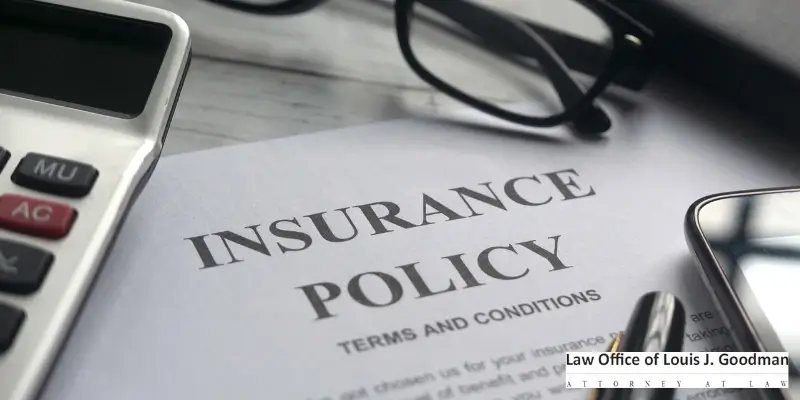|
|
Last Modified on Sep 15, 2025
There are various types of insurance fraud, including auto insurance fraud, workers’ compensation fraud, life insurance fraud, property fraud, and other forms of fraudulent activity.
With 25 years of experience, Former Alameda County Deputy District Attorney, Louis J. Goodman understands the intricacies of the legal system and has helped numerous individuals exercise their Constitutional rights in the face of insurance fraud accusations. If you were arrested, you need competent, innovative, client-centered representation to protect your rights.
Defrauding An Insurance Company Is a Serious Offense
If you have been accused of insurance fraud, you may face serious consequences potentially including years in prison if convicted. Protect your future with experienced and competent legal support. Consult a leading criminal defense lawyer in Oakland.
Are you charged with fraudulent activity? Do you believe you might have committed such fraud inadvertently? No matter your situation, it’s a good idea to understand the types of insurance fraud and how you can avoid them.
Let’s cover everything you need to know.
What Is Fraud in the Insurance Industry?
Insurance fraud is a serious crime that involves intentional deceit and fraudulent activities aimed at obtaining financial gain from insurance companies. There are various types of insurance fraud, including health insurance fraud, workers’ comp fraud, property insurance fraud, and auto insurance fraud.
Criminal defense attorneys representing clients charged with insurance fraud must always provide a strong defense against the allegations brought forth by the prosecution.
Insurance fraud directly affects insurance companies and the industry as a whole. These companies collect premiums from policyholders with the understanding that they will pay claims when necessary. However, fraudulent claims burden insurers, affecting their capacity for paying claims promptly and increasing insurance premiums for all consumers.
Hard fraud refers to deliberate and intentional fraudulent acts committed with the sole purpose of getting money. Meanwhile, soft fraud refers to dishonest actions that exaggerate legitimate claims or manipulate the insurance system to obtain personal benefits. Soft fraud typically involves misrepresentation or omission of information but does not involve premeditated planning or deliberate acts to deceive the insurance company.
Because both types of fraudulent activity against an insurance company can be serious, you should immediately contact a trusted attorney. If you have complex questions and concerns, a Oakland insurance fraud defense lawyer can assist.
Which Organizations and Bureaus Oversee Insurance Fraud?
To combat defrauders and protect the public interest, numerous organizations and bureaus, such as the National Insurance Crime Bureau and bureaus at both the state and federal levels, actively investigate and prosecute those suspected of committing insurance fraud.
Here are some main entities involved in combating those who commit insurance fraud:
- National Insurance Crime Bureau (NICB): The NICB is dedicated to addressing insurance fraud. It collaborates with insurance companies, law enforcement agencies, and other stakeholders to identify, investigate, and prevent fraudulent activities across various types of fraudulent claims.
- State Insurance Fraud Bureaus: Each state typically has its own Insurance Fraud Bureau or similar entity responsible for addressing fraudsters within its jurisdiction. These bureaus work closely with insurers, federal law enforcement agencies, and other organizations to detect, investigate, and prosecute fraudulent activities, including health insurance, workers’ compensation, property insurance, and auto insurance fraud.
- Federal Agencies: Federal entities such as the Federal Bureau of Investigation (FBI) and the Department of Justice (DOJ) play critical roles in combating fraudsters and protecting consumers. They investigate and prosecute cases involving significant financial losses, organized crime elements, or violations of federal laws. Their jurisdiction extends to any case that affects interstate commerce or involves federal programs like Medicare or the Affordable Care Act.
- Insurance Commissioners: State Insurance Commissioners or Departments of Insurance oversee insurance activities within their respective states. These commissioners regulate insurers, enforce insurance laws, and may have dedicated units or divisions investigating suspected insurance fraud.
- Coalition Against Insurance Fraud (CAIF): The CAIF is a national association of insurance companies, consumer advocacy groups, and government agencies. It collaborates to raise awareness, advocate for anti-fraud legislation, share best practices, and provide resources for combating fraudsters across various types of insurance.
These organizations and bureaus collectively work to combat fraud, safeguard insurers and consumers, and keep the insurance industry strong. Their efforts involve investigating suspected fraud, promoting awareness, developing anti-fraud measures, and taking legal action against those who commit fraud.
Insurance companies, bureaus, and law enforcement agencies work together to investigate suspected cases through techniques such as advanced data analysis, artificial intelligence, and predictive modeling to identify potential fraud indicators. News releases keep the public informed!
From Health Insurance Fraud to Auto Fraud: Types of Insurance Frauds

Now that you know the bodies that address insurance company fraud, you’re probably wondering what kind of fraud they handle. Whether it be deliberate deception, an otherwise legitimate claim, or some mixture of the two, any claim that is not legitimate may lead to severe legal consequences.
Specific organizations and entities may play a bigger role when an insurance company or insurance agents are reporting fraud, depending on the type of fraud reported.
False claims – or a suspected false insurance claim – take a variety of forms. From lies on an insurance application to false reports such as false police reports, identity theft, and staged auto accidents, potential fraud can be filed in many ways.
Here are some common types of fraudulent activity:
Health Insurance Fraud
Defrauding a health insurance company encompasses deceptive practices aimed at obtaining financial gain through the manipulation of coverage, health plans, and health care benefits.
For example, a healthcare provider may bill an insurance company for unnecessary services that were never rendered or inflate the costs of services rendered. Similarly, healthcare providers may perform unnecessary medical procedures, tests, or treatments solely to bill insurers and receive financial compensation.
These fraudulent claims may also involve intentionally misrepresenting non-covered services as covered ones to obtain reimbursement from the insurance company. Some healthcare providers may even engage in illegal schemes where they receive financial kickbacks or incentives for referring patients to specific healthcare services or facilities. This type of fraud can lead to unnecessary referrals and treatments, driving up healthcare costs.
Workers’ Compensation Fraud
This type of claims fraud involves deceitful actions aimed at obtaining financial gains by manipulating workers’ compensation claims. Workers’ compensation fraud undermines the integrity of the system, increases insurance premiums for employers, and compromises the well-being of workers injured.
For instance, an employee may falsely claim an injury occurred or exaggerate the severity of an existing injury to receive workers’ compensation benefits.
Further fraudulent claims can occur when an employee falsely attributes a non-work-related injury to a workplace incident to receive workers’ compensation benefits. Some employees even stage accidents to deceive an insurance agent and receive insurance money.
Property Insurance Fraud
This type refers to fraudulent activities involving insurance policies covering homes, businesses, or other properties.
This may involve exaggerating the property value or claiming personal belongings that were not present in the property at the time of the fire. In other cases, a policyholder may claim that expensive items were stolen or that property damages are more extensive than they are, aiming to receive a higher payout.
Defrauders may seek to receive money, save money through a reduced cost, or prevent an insurance company from collecting premiums. Fraudulent property insurance claims include false burglary claims, fraudulent repairs and improvements, and inflating property value.
Auto Insurance Fraud
Consumers involved in these fraudulent activities seek to manipulate automobile insurance coverage policies. The insurer may receive a claim that is exaggerated or completely fabricated.
Some fraudsters orchestrate accidents by intentionally causing collisions or making it appear as if an accident occurred. They may involve multiple vehicles or pedestrians to maximize claims on the supposed accident. Other individuals may attempt to file claims for damages that existed before the insurance policy’s coverage period.
Exaggerated Injuries or medical treatment are also common after an accident. In certain cases, a so-called phantom vehicle insurance claim or evasion of premiums (by claiming a vehicle is only for personal use), also contribute to fraudulent activity.
Life Insurance Fraud
This refers to intentionally deceiving an insurance company or manipulating the life insurance system to obtain financial benefits or payouts that are not legitimately entitled.
For example, an individual might stage their death or provide false insurance information about a death to the insurance company. Another example is stranger-originated life insurance (STOLI), wherein investors or intermediaries persuade individuals, often elderly or financially vulnerable, to take out life policies that they then use to sell insurance to investors.
There are also beneficiary, agent, and viatical settlements issues, which involve selling a life insurance policy to a third party for less than the face value of the policy. A fraud bureau will investigate such a claim to determine the level of deception or falsehood and how it was executed.
Premium Fraud
These fraudulent activities involve manipulating the premium payment process or providing false information to obtain a lower premium or financial benefits that are not rightfully deserved.
Policyholders may intentionally conceal or provide inaccurate information about their health condition, driving record, or other risk factors to obtain lower premiums. In other cases, a policyholder misrepresents the primary driver of a vehicle or the owner of a property to take advantage of lower premiums.
Some policyholders even provide false addresses to take advantage of lower premiums associated with a specific geographic location!
Premium fraud impacts both insurers and honest policyholders. Insurers may face financial losses due to underpriced premiums, while honest policyholders may experience increased premiums to compensate for fraudulent activities. To combat premium fraud, insurance companies employ various measures such as thorough underwriting processes, data analysis, and investigation of suspicious activities.
Identity Theft
This form of theft is the stealing and misusing of sensitive data, such as Social Security numbers, credit card information, or driver’s license details, to impersonate the victim and carry out fraudulent activities.
A fraudster may steal someone’s health information to obtain medical services, prescription drugs, or expensive procedures without the victim’s knowledge or consent. In cases of workers’ compensation, stolen identities can occur when an individual falsely assumes another person’s identity.
All these types of defrauding can result in diminished company funds, broken business rules, increased premiums for consumers, and undermined integrity of the industry while hurting the public interest. Detecting and combating fraud involves the collaborative efforts of insurers, fraud bureaus, regulatory bodies such as commissioners, and organizations like the National Insurance Crime Bureau and the Coalition Against Insurance Fraud.
Avoid Fraud and Insurer Issues With Top Legal Support

Are you facing legal trouble? Obviously, you should always abide by the law and do your due diligence to avoid errors and practices that lead to issues. But the intricacies of hard and soft insurance fraud are not always clear, and it’s possible for well-meaning individuals to accidentally commit, or falsely be accused of fraud.
If you’ve been charged, you may face serious consequences. It’s necessary to get your case properly handled. With the help of a leading Alameda County criminal defense attorney, the majority of criminal cases don’t lead to jail time. Some are dismissed, while others result in plea bargains.
For your best chance at protecting your rights with a sound defense in court, consult a Top Criminal Defense Attorney with an Avvo Rating of 10.0.
Call Louis J. Goodman today.








